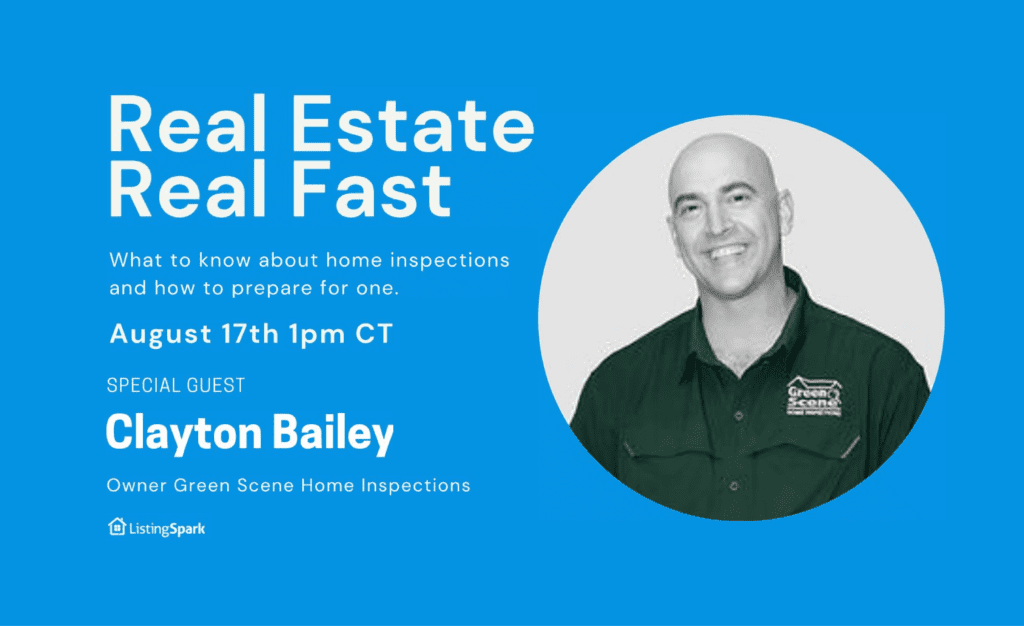
Real Estate Real Fast EP3 (with Clayton Bailey, Owner of Green Scene Home Inspections)
Episode overview
Home inspections are a critical part of real estate. They impact both buyers and sellers and are key in negotiations and identifying any problem areas in homes.
Even if you’re buying new construction, you should be using a home inspector.
For most buyers and sellers though, they don’t know what they should be looking for in a home inspection. What kind of issues will an inspector be looking for?
And if the inspector finds issues, what needs to actually be fixed? Is there anything you can do to better prepare for future home inspections?
We’ll dive into home inspections and walk you through everything you need to know with Clayton Bailey, Owner of Green Scene Home Inspections.
Episode highlights
- What Clayton and Green Scene Home Inspections do
- What’s the value of getting a good home inspector for buyers
- Why the little details are becoming more important to follow in home inspections
- What an example of a well-maintained home looks like to an inspector
- Here are the type of home issues are inspectors looking for
- What are some of the craziest home inspection stories Clayton and Aaron have been a part of
- Why it’s important to use a home inspector for new construction
- What a good home inspector should be looking for in new construction
- Why sellers should always be ahead of home inspections when selling a property
- What home issues can arise in areas with a drought
- Here’s what Austin buyers and sellers should be looking at when it comes home inspections
Episode links:
- Follow ListingSpark on LinkedIn, Twitter, Instagram, Facebook, YouTube, and TikTok
- Connect with Aaron Jistel on LinkedIn
- Connect with Clayton Bailey on LinkedIn
Key takeaways
1:08 – What Clayton and Green Scene Home Inspections do
Clayton is a third-generation home inspector. His business, Green Scene Home Inspections, has been in business for over 15 years and has inspected 10,000+ homes. Not only does Clayton have a home inspection business, he also creates courses for buyers, sellers, and realtors around home inspections.
“We’re coming up on almost 10,000 houses that we’ve done as a company, in the 14, 15 years that we’ve been in business. We’ve got 13 inspectors spread throughout Dallas-Fort Worth, Austin, San Antonio. We do a fair amount of houses a month and absolutely love it. I also teach for American Home Inspector Training. So I teach for a national home inspections school that teaches home inspectors. And then I also teach CE classes to real estate agents as well. So they have to have that state continuing education to maintain their license.
So I travel quite a bit across the state of Texas going to different places to train home inspectors.”
2:34 – What’s the value of getting a good home inspector for buyers
A good inspector can take that 30-40 page document and coach you on what you should really get fixed and what’s worth negotiating with a seller. Getting a home inspector first is important because they can identify big issues where you might need an expert to come in and take a look.
“Typically we get contacted right after the contract is executed and they say, “Hey, you’re, you know, we’re in our option period and you got to go.” So we’re usually the first ones to get in. The benefits of having that first is so that if we find something going on in plumbing or electrical or HVAC or whatever, then you’ve got time to get those people in there to look at that.”
4:12 – Why the little details are becoming more important to follow in home inspections
When the market was high, most buyers were only interested in the big issues. Now they are interested in the details too. The smart buyers are looking at the small details because they want to make sure they aren’t overpaying on a home that might require more investment soon.
“Now the market is starting to shift and people are starting to pay attention to those home inspection reports and, you know, it’s one of those things where we’re going in to look at a house in a snapshot of time where we’re turning on everything that could possibly be turned on.
We’re running all the appliances, running the AC as low as we can get it. Running the heat really hot. We’re getting on the roof. We’re going under the house. Checking all the outlets.
We’re really turning everything on all at the same time to try to see if there’s any weak spots or if there’s anything broken that’s going on. That way that buyer knows, hey, here’s what’s going on with this house whether it’s been not maintained very well, or the owners have lived here and they’ve upgraded some things. So it’s just kind of to see that through a different set of eyes.”
6:46 – What an example of a well-maintained home looks like to an inspector
Clayton says the best homes to inspect are the ones with great paper trails. If a homeowner has receipts from anything they’ve checked on the exterior, interior, structure, HVAC, etc., it’s generally a good sign that the owners have taken care of the property.
“One of the ultimate examples of a house that I had that I walked through the door—beautiful house, probably, 3800 square feet, slab house from the ’90s.
But as I walked through the front door on the table right there in the entry, there’s a box that says, “Exterior receipts.” And then there’s another box that says, “Interior receipts.” And then there was a structural engineer report sitting there that they had just had done. There were receipts from the HVAC company that just came out and had everything serviced.
And you kind of sit back and you go, “Okay. I like this house. I haven’t even looked at it yet but there are great homeowners. This is exactly who I would want to buy a house from. Somebody that really maintains it. They can show all the paper trail of everything that’s been done. It’s not just some we don’t know person that’s just doing everything.”
So that would be the main, like, ultimate scenario for us to walk into.”
9:54 – Here are the type of home issues are inspectors looking for
Good home inspectors will be looking for 3 types of potential issues—things that are broken, things that are causing damage, and things that are unsafe. Even if something is working but it’s not up to code, a good home inspector will say you need to get it fixed because it’s a safety thing.
“We have to go by today’s current building code and standards. And if the house was built in the ’70s, well, there’s gonna be a lot of stuff that doesn’t meet that code, right? We no longer use the word grandfathered. So that is something that we no longer say or do. But it’s kind of like if it’s broken, if it’s causing damage to the house, or if it’s unsafe.
If it’s one of those three, we need to be talking about it or, or negotiating for it. So if it’s broken, you know, it needs to be fixed. If it’s causing damage to the property… so you have to kind of look at it from an insurance standpoint to say well, if it’s causing damage, we need to get on that so it doesn’t cause more damage, right?
Then if it’s a safety issue, that’s just a clear given. You know, we want to keep people safe. That’s, that’s the whole goal of the home inspector is to make sure that nothing bad ever happens to someone in that house.”
12:27 – What are some of the craziest home inspection stories Clayton and Aaron have been a part of
Since his company has worked on over 10,000 inspections, Clayton has had a lot of crazy home inspection stories. Things like finding body-sized holes, people not keeping their home doors locked, issues with finding drugs, etc. The key if you’re getting a home inspection is to be prepared!
“I personally have probably run into six different situations, like, grow rooms whether they live, in use at the time or you could see all the outlets everywhere where they had a bunch of stuff plugged in. My former instructor had a situation where the house that he inspected, the parents were sent to jail and their kid was put into Child Protective Services. Their new born baby crawling around the house had been sick. And when they took the baby to the doctor, it tested positive for methamphetamines.
And, instantly they flagged the parents and went through all this stuff. And come to find out, the previous people that lived in the house were cooking meth in the living room and it spilled over into the concrete.
And since the little baby was, like, learning how to crawl in the living room floor, even though there was new carpet there, the fumes and everything came out and, you know, did bad things to the baby.”
19:10 – Why it’s important to use a home inspector for new construction
If you’re buying new construction, it doesn’t mean you should skip out on a home inspector. With the way building is going right now, many builders are starting to cut corners. They have a high volume of houses to complete so new tradespeople are constantly coming in and there is risk of something not being done correctly.
“I feel like this market that the builders are being put in right now, it’s starting to head that same way where they’ve been kind of snobby and snooty with buyers about, you know, you got to use our lender. You got to use our title company. You got to… and now, they’re, they’re starting to dump inventory.
And so you’re starting to see they’re going to start cutting corners and techniques and that kind of fun stuff. But, you know, I will give it to builders. All of them, they mean to do a good job.
It’s not that they intentionally go out to screw somebody over or build a house poorly. But inevitably what happens is is that they’re trying to build the volume of houses that they’re building and, and you have your A team and your B team and your C team in different developments and you always have a new guy, you always have a new trades person in there and that they might not know what they’re doing.”
20:32 – What a good home inspector should be looking for in new construction
Clayton says if you’re buying new construction you should try and bring in your own home inspector in as early as possible. Even before concrete is poured, sometimes inspectors can find issues with plumbing and framing. By using an inspector early and often, you can minimize potential problems in new construction.
“There’s nothing worse than a house that’s built poorly from the beginning because it’s hard to go back and undo that from the, from that phase inspection standpoint. But usually there’s one of the trades peoples that, you know, either the plumber or the framer or the roofer, you know, most everybody does a decent job. It’s just that there’s one of those trades that’s not gonna be so good.
And, down in Austin we’ve got one of my inspectors, he’s just killing all these builders with the windows and, and windows are hard to get right now anyway. But you’re not supposed to use air guns and shoot the nails into the window frame. You’re supposed to hand hammer those in so that way when the heat moves the windows and the bricks and stuff that it’s got that natural settlement and that they’re not there. Well, we’re finding windows that they’ve just, you know, boom, boom, boom, boom, they’re shooting nails in and they’re breaking all the little fins all around the windows so they’re gonna leak.”
23:31 – Why sellers should always be ahead of home inspections when selling a property
Most homeowners aren’t constantly checking everything out in their house over the course of living in it. You might never go on the roof, you might not have checked the attic, you might not have checked the electric panel. That’s why it’s important to bring in a home inspector before selling.
“There’s a lot of inherent value if sellers are concerned about the condition of their house. They’ve lived there 20 years or 15 years and they don’t know what they don’t know, and a lot of times there’s absolutely nothing malicious at all.
They just haven’t gone up on the roof. They haven’t been in their attic. They haven’t opened up their electrical panel. And so, there is some value in being able to get ahead of things.
And then, that makes a buyer feel a whole lot better too knowing, like you said, there’s a stack of receipts. It is clear that there was some sophisticated home ownership going on where they were taking care of the house. That makes buyers feel a whole lot better.”
25:47 – What home issues can arise in areas with a drought
Homeowners in drought areas need to look out for potential foundation issues. In areas with lots of droughts, the soil drying out can cause the foundation to move. It’s a problem for homes built in the Houston area.
“We’re in a pretty bad drought. What a lot of people don’t realize is when you go this long without getting a sustained amount of rain, that really can be tough on the foundation. If the soil makeup is changing or drying out, it, you know, can cause gaps underneath the house and cause some foundation movement.
So we are seeing more and more foundation issues happening right now, which, again, makes inspections even more important when you’re buying or selling a house so you know what you’re working with.”
28:00 – Here’s what Austin buyers and sellers should be looking at when it comes home inspections
In Austin, there can be home issues depending on where you live. The further West you go the better because you have limestone which is good to build on. For other homes, you may have issues with sewer pipes because the land is more clay than rock.
“That’s probably the most expensive problem to have in real estate is having to do with the sewer lines underneath and that it’s caused that foundation movement.
But Austin and, East Austin you run into Orangeburg, which is the original sewer pipe that’s just tar paper and sawdust, like, rolled up and it gets crushed or it just doesn’t stay together and it’s bad.
And then, yes, we went into cast iron and that’s, you know, some tough stuff to deal with. You, you get into having to do sewer tests.
And so, I would say for sellers out there if you’re suspicious like you’ve got maybe something going on, some cracks inside your house outside of a bathroom or a kitchen or something like that, might want to look at having a sewer test done just to make sure that everything is good because that could be a big whammy that could come back in the middle of a contract and hit you and that’s one that you don’t want to, uh, have to, it’s not fun to dodge that one. You gotta deal with it.”
Related Posts
Selling a House Without a Realtor: Hidden Costs & Risks
When homeowners consider the risks of selling a house without a realtor, they often focus solely on potential commission savings. However, FSBO homes sold for a median of $380,000 in 2024, compared to $435,000 for…
Do You Need a Realtor to Sell a House?
The latest data from the National Association of Realtors shows that 90% of home sellers use agents, but this raises an important question: Do you need a realtor to sell a house? While the majority…
2025 Texas Real Estate Housing Report: Market Trends, Prices, and Forecasts
The Texas real estate landscape continues to evolve as we move through 2025, presenting both opportunities and challenges for buyers, sellers, and investors across the Lone Star State. This comprehensive 2025 Texas Real Estate Housing…




